| Kirk E. Anderson |

|
 |
Kirk E. Anderson Lead Scientist, Molecular/Microbial Ecologist Carl Hayden Bee Research Center 2000 E. Allen Road, Tucson, AZ 85719 520- 670-6380 ext. 122 (Office) 520-670-6493 (FAX) |
Education
Ph.D. 2006 Arizona State University, Molecular Ecology
M.S. 2002 Boise State University, Molecular Ecology
B.A. 1997 Boise State University, Biology
Professional experience
2023-present: Associate editor; Microbiome, Animal Microbiome
2021-present: Associate editor; Frontiers in Microbiology
2019-present: Associate editor; Insects
2013-present: Lead Scientist, USDA-ARS, Carl Hayden Bee Research Center, Tucson, AZ.
2010-present: Adjunct Scientist, Dept. of Entomology, University of Arizona, Tucson, AZ.
2010-present: Member of the Center for Insect Science, The University of Arizona, Tucson, AZ.
2009-present: Microbial Ecologist, USDA-ARS, Carl Hayden Bee Research Center, Tucson, AZ.
2009: Adjunct Professor, Dept. of Biology, Pima Community College, Tucson, AZ.
2006-2009: NIH Post-Doctoral Fellow, Dept. of Entomology, University of Arizona, Tucson, AZ.
2006: Lecturer, General Entomology, Arizona State University, Tempe AZ.
2005-2006: Research Specialist, Center for Social Complexity, Arizona State University, Tempe, AZ.
2005: Adjunct Professor, Dept. of Biology, Scottsdale Community College, Scottsdale, AZ.
2004-2005: Teaching Associate, Center for Social Complexity, Arizona State University, Tempe, AZ.
2002-2004: Graduate Research Associate, School of Life Sciences, Arizona State University, Tempe, AZ.
1998-2001: Graduate Teaching Assistant, Dept. of Biology, Boise State University, Boise ID.
Grants / Agreements / Incoming funds
2022-2024 National Program Post-Doctoral award ($140,000.00) United States Department of Agriculture, Agricultural Research Services: “Using A.I. and Big Data to Diagnose Honey Bee Larval Disease” PI: Kirk E. Anderson
2022-2023 Scientific Beekeeping ($5,000.00) Trust Fund Cooperative Agreement: Effect on the hindgut microbiota of two major probiotics and recovery from two major antibiotics. PIs: Kirk E. Anderson and Randy Oliver
2020-2025 National Institute of Food and Agriculture, (424,000.00) Agriculture and Food Research Initiative, Foundational and Applied Science Program, Pollinator Health: Research and Application. “Using big data to improve diagnosis of larval health and disease in honey bees” PI: Kirk E. Anderson, CoPIs: Meghan Milbrath, Jay Evans. Key Personnel: Brendon M. Mott
2020-2021 Dalan Animal Health Inc. ($23,000.00) Material Transfer Research Agreement: Transgenerational immune priming and the microbiota of the queen and her retinue. PIs: Kirk E. Anderson and Dalial Freitak
2019-2022 University of Minnesota, Marla Spivak, ($6,275.00) Trust Fund Cooperative Agreement: The mouth and gut microbiota associated with propolis application. PIs: Kirk E. Anderson and Marla Spivak
2019-2023 National Science Foundation ($1,496,380.00) “Building Capacity: Integrating Research, Mentoring, and Industry Collaborations to Improve STEM Recruitment and Retention”.
PI: Robin Cotter, CoPIs: Pamela Marshall, Elena Ortiz, Anna Marti-Subirana, Kirk E. Anderson
2017-2018 California State Beekeepers Association ($24,977.00) Trust Fund Cooperative Agreement: “Development of Bacillus thuringiensis as a Varroa mite management tool”. PI: Kirk Anderson, Co-PI: Vincent Ricigliano
2016-2018 Almond Board ($23,580.00) “The Longitudinal Effect of Supplemental Forage on Honey Bee Colony Growth, Immunity, and Pathogen Resistance” PI: Quinn McFrederick, Co-PI: Kirk E. Anderson
2016-2018 Ashurst Bee Company (20,000.00) “Southern migratory beekeeping: Longitudinal overwintering study of queen, worker and colony health” PI: Kirk E. Anderson
2016-2017 California State Beekeepers Association ($14,420.00) “Screening for strains of Bacillus thuringiensis to be used as non-chemical biological controls of Varroa destructor and Small Hive Beetle”. PI: Kirk E. Anderson Co-PI: Vincent Ricigliano
2015-2016 National Honey Board, ($25,000.00) “Preservation and distribution of probiotic Acetobacteraceae Alpha 2.2 for use by beekeepers”. PI: Kirk E. Anderson, Co-PI: Vanessa Corby-Harris
2015 National Honey Board, ($20,000.00) “The probiotic potential of Lactobacillus kunkeei for honey production” PI: Quinn McFrederick, Co-PI: Kirk E. Anderson
2014-2016 National Program Post-Doctoral award ($140,000.00) United States Department of Agriculture, Agricultural Research Services, National Program: “Longitudinal Studies of Migratory Honey bees” PI: Kirk E. Anderson
2014-2015 Browning’s Honey Co., Inc. (35,000.00) “Large Scale Migratory Beekeeping Research” Effects of agricultural landscape, supplements and overwintering on the long-term health and survival of honey bees in a large scale migratory setting. PI: Kirk E. Anderson
2013-2014 California State Beekeepers Association ($14,740.00) “The effect of open dry feeding and shelf life of pollen substitute on honey bee microbiota” PIs: Kirk E. Anderson and Randy Oliver
2013-2014 National Honey Board, ($24,800.00) “Probiotic use of Acetobacteraceae Alpha 2.2 for improving honey bee colony health” PI: Kirk E. Anderson, Co-PI: Vanessa Corby-Harris
2009-2012 National Institutes of Health Post-Doctoral Award ($138,000.00) “Understanding the link between social behaviors and the microbiome in honey bees” PI: Svetlana Vojvodic, CoPI: Kirk E. Anderson
2006-2009 National Institutes of Health Post-Doctoral Award ($146,000.00) “Causes and consequences of genetic caste determination in social insects” PI: Kirk E. Anderson, Co-PI: Diana Wheeler
2004 National Science Foundation, Doctoral Dissertation Improvement Grant ($10,841.00) “Consequences of Hybridization in the Harvester Ant Pogonomyrmex” PI: Jennifer Fewell, Co-PI: Kirk E. Anderson .
2003 Ecological Society of America, Desert Ecology-Forrest Shreve Award ($862.00) “A mosaic of exogenous factors selects for hybridization in the Harvester Ant Pogonomyrmex” PI: Kirk E. Anderson
2003 Arizona State University departmental travel grant ($300.00) “Obligate hybridization and genetic caste determination in Pogonomyrmex” PI: Kirk E. Anderson
2001 Boise State University departmental research grant ($500.00) “The development of molecular markers for parental and hybrid populations in polyandrous insect societies.” PI: Kirk E. Anderson
2000 Sigma Xi Grant-in-aid of research ($1,000.00) “Development of Inter Simple Sequence Repeat (ISSR) markers to quantify hybrid inheritance patterns in the Harvester Ant Pogonomyrmex.”
PI: James Smith, Co-PI: Kirk E. Anderson
Awards, Honors, Media
2024 Nov. Invited interview. Microbiome research presented on "Inside the Hive TV-Podcast" organized by Humberto Boncristiani "Are Probiotics Really Helping Bees?" https://www.youtube.com/playlist?app=desktop&list=PLzMvo1IUOsOfEUEnPVOm83KlfKWSgi8QM
2024 Oct. Microbiome research featured on “The Bee Listener; The Truth about Probiotics" By Ann Chilcott. https://www.beelistener.co.uk/bee-health/the-truth-about-probiotics/
2024 Sept. Invited interview. Microbiome research presented on "Two Bees in a Podcast, organized by University of Florida Honey bee lab Jamie Ellis and Amy Wu "Commercial Honey bees and Non-native Probiotics" https://open.spotify.com/episode/5F5Z4uWoJGk623tVy7auAr
2024 July. Invited Article. Bee Culture, "The hopeful state of probiotic science" https://www.beeculture.com/the-hopeful-state-of-probiotic-science/
2024 May. Microbiome research featured in American Bee Journal; "A Field Trial of Probiotics: Part 2" by Randy Oliver https://scientificbeekeeping.com/8601-2/
2023 August. Invited Article. Bee Culture, “Antibiotics, Disease Diagnosis and Artificial Intelligence”. https://www.beeculture.com/antibiotics-disease-diagnosis-and-artificial-intelligence/
2023 May. Invited Article. Bee Culture featuring microbiome research at Carl Hayden Bee Research Center https://www.beeculture.com/the-carl-hayden-bee-research-center/
2021 April. Invited Article. Bee Culture Magazine “Bees Need Meat?” https://www.beeculture.com/bees-need-meat/
2020 Sept. ARS Annual Report on Science: Top 2020 Research Accomplishments. Access to U.S. Conservation Reserve Program (CRP) lands greatly improves honey bee colony health. https://www.ars.usda.gov/research/ars-annual-report-on-science/
2019 June. USDA Blog: “Boosting Bee Health…Naturally” Posted by Sue Kendall https://www.usda.gov/media/blog/2019/06/19/boosting-bee-healthnaturally
2019 March. AgResearch News: “Honey Bee Colonies More Successful By Foraging on Non-Crop Fields” By Kim Kaplan https://www.ars.usda.gov/news-events/news/research-news/2019/honey-bee-colonies-more-successful-by-foraging-on-non-crop-fields/
2019 March. Microbiome research featured in “Scientific Discoveries” Documenting the Impact of Agricultural Research Service (ARS) in Fiscal Year 2018. “A “Gut Check” for Improved Honey Bee Health” https://www.ars.usda.gov/oc/discoveries/2019/index/
2018 Oct. Landscape research featured in Bee Culture: “Found in Translation: Snowbirds, snow, and supplements shed light on overwintering success” By Jay Evans https://www.beeculture.com/magazine/
2018 Aug. UA News: “The Queen Bee and the Fountain of Youth” By Daniel W. Stolte https://uanews.arizona.edu/story/queen-bees-and-microbial-fountain-youth
2018 July. Ag Research News “Species Shifts in the Honey Bee Microbiome Differ with Age and Hive Role” By Kim Kaplan https://www.ars.usda.gov/news-events/news/research-news/2018/species-shifts-in-the-honey-bee-microbiome-differ-with-age-and-hive-role/
2018 July, Arizona State University: “UA students abuzz about honey bee research” Youtube video. https://www.youtube.com/watch?v=xKa4SApNOVM
2016 Nov. UA News: “UA Scientists Go by the Gut on Health of Honey Bees” By Robin Tricoles https://uanews.arizona.edu/story/ua-scientists-go-gut-health-honey-bees
2016 Nov. AgResearch News: “Bacterial Imbalances Can Mean Bad News for Honey Bees” By Jan Suszkiw https://www.ars.usda.gov/news-events/news/research-news/2016/bacterial-imbalances-can-mean-bad-news-for-honey-bees/
2016 Nov. Research featured on the Science Channel: “What on Earth” Series 3 Episode 1 “Lost Treasure of the Grand Canyon” https://www.sciencechannel.com/tv-shows/what-on-earth
2016 May. Research featured in Bee Culture: “A Closer Look: Starvation/Undernourished Colonies” by Clarence Collison. https://www.beeculture.com/closer-look-starvationundernourished-colonies/
2016 Dec. Research featured in Bee Culture: “Bee Pollen – An Overview” by Ross Conrad https://www.beeculture.com/bee-pollen-overview/
2015 USDA-ARS Early Career Scientist of the Year Award, Pacific West Area “for innovative research on the role of microbes in honey bee nutrition and colony health” https://www.ars.usda.gov/news-events/news/research-news/2015/usdas-agricultural-research-service-honors-scientists-of-the-year/
2015 Dec. Research featured in American Bee Journal: “Reevaluating Beebread: For Preservation or Digestion?” By Randy Oliver http://scientificbeekeeping.com/reevaluating-beebread-part-3/
2015 Nov. Research featured in American Bee Journal: “Reevaluating Beebread: The Players” By Randy Oliver http://scientificbeekeeping.com/reevaluating-beebread-part-2/
2015 Nov. Research featured in Bee Culture: “The National Strategy To Promote The Health Of Honey Bees And Other Pollinators” by M.E.A. McNeil https://www.beeculture.com/the-national-strategy-to-promote-the-health-of-honey-bees-and-other-pollinators/
2015 Oct. Research featured in American Bee Journal: “Reevaluating Beebread: The Story” by Randy Oliver. http://scientificbeekeeping.com/reevaluating-beebread-part-1/
2015 May. Featured in Nature Article: “Microbiome: The Puzzle in a Bees Gut” by Alla Katsnelson http://www.nature.com/articles/521S56a
2015 May. AgResearch News: “Newly named bacterium helps honey bee larvae thrive” by Kim Kaplan http://www.ars.usda.gov/is/pr/2015/150506.htm
2014 Dec. Applied and Environmental Microbiology, Spotlight article: Origin and effect of Acetobacteraceae Alpha 2.2 in honey bee larvae and description of Parasaccharibacter apium, gen. nov., sp. nov. http://aem.asm.org/content/80/24/7460
2012 Jan. Ant microbiome research featured in Molecular Ecology, News and Views Perspective: “Behind every great ant, there is a great gut” by Michael Poulsen and Panagiotis Sapountzis https://doi.org/10.1111/j.1365-294X.2012.05510.x
2008 Nov. Doctoral Research featured in Dr. Bert Hölldobler and Edward O. Wilson’s book “The Superorganism: The Beauty, Elegance, and Strangeness of Insect Societies”. https://dl.acm.org/citation.cfm?id=1529924
Wikipedia, The Free Encyclopedia: Characterization of "Ant" and "Honey bee". In reference to Anderson et al. 2008, Anderson et al. 2012, and Anderson et al. 2014. https://en.wikipedia.org/wiki/Ant https://en.wikipedia.org/wiki/Honey_bee
Peer-reviewed publications
Anderson KE and Copeland DC. 2024. The honey bee "hive" microbiota: Meta-analysis reveals a native and aerobic microbiota prevalent throughout the social resource niche. Frontiers in Bee Science 2, https://doi.org/10.3389/frbee.2024.1410331
Copeland DC, Ricigliano VA, Mott BM, Kortenkamp OL, Erickson RJ, Gorrochategui-Ortega J, Anderson KE. 2024. A longitudinal study of queen health in honey bees reveals tissue specific response to seasonal changes and pathogen pressure. Sci Reports 14, 8963. https://doi.org/10.1038/s41598-024-58883-1
Anderson, KE, Allen NO, Copeland DC, Kortenkamp OL, Erickson RJ, Mott BM, Oliver R. 2024. A longitudinal field study of commercial honey bees shows that non‑native probiotics do not rescue antibiotic treatment, and are generally not beneficial. Sci Reports 14, 1954. https://www.nature.com/articles/s41598-024-52118-z
Carroll, MJ, Brown, NJ, Ruetz, ZJ, Ricigliano, VA, Anderson, KE. 2023. Honey bee retinue workers respond similarly to queens despite seasonal differences in Queen Mandibular Pheromone (QMP) signaling. PLoS ONE. 18(9). https://doi.org/10.1371/journal.pone.0291710
Anderson KE, Copeland, DC, Erickson, RJ, Floyd AS, Maes PW, Mott BM. 2023. A high-throughput sequencing survey characterizing European foulbrood disease and Varroosis in honey bees. Sci Reports 13, 1162. https://doi.org/10.1038/s41598-023-28085-2
Anderson KE and Mott, BM. 2023. "Ecology of Pollen Storage in Honey Bees: Sugar Tolerant Yeast and the Aerobic Social Microbiota" Insects 14, no. 3: 265 https://doi.org/10.3390/insects14030265
Copeland DC., Maes PW., Mott BM., Anderson KE. 2022. Changes in gut microbiota and metabolism associated with phenotypic plasticity in the honey bee Apis mellifera. Frontiers in Microbiology 13, https://www.frontiersin.org/articles/10.3389/fmicb.2022.1059001
Anderson KE, Ricigliano, VA, Copeland, DC, Mott BM, Maes P. 2022. Social Interaction is
Unnecessary for Hindgut Microbiome Transmission in Honey Bees: The Effect of Diet and Social Exposure on Tissue-Specific Microbiome Assembly. Microbial Ecology https://doi.org/10.1007/s00248-022-02025-5
#Copeland DC, #Anderson, KE, and Mott, BM. 2022. Early queen development in honey bees: Social context and queen breeder source affect gut microbiota and associated metabolism. Microbiology Spectrum 10:e0038322. doi: https://doi.org/10.1128/spectrum.00383-22
#Authors contributed equally
Anderson KE, Maes, PW. 2022. Social microbiota and social gland gene expression of worker honey bees by age and climate. Sci Reports 12, 10690. https://doi.org/10.1038/s41598-022-14442-0
*Maes PW, Floyd AS, Mott BM, Anderson KE. 2021. Overwintering Honey Bee Colonies: Effect of Worker Age and Climate on the Hindgut Microbiota. Insects 12, 224. https://doi.org/10.3390/insects12030224
Smith EA, Anderson KE, Corby-Harris V, McFrederick QS, Parish AJ, Rics DW, Newton ILG. 2021. Reclassification of seven honey bee symbiont strains as Bombella apis. Int J Syst Evol Microbiol. 71(9) https://doi.org/10.1099/ijsem.0.004950
*Floyd, AS, Mott, BM, Maes PW, Copeland, DC, McFrederick QS, Anderson KE. 2020. Microbial Ecology of European Foul Brood Disease in the Honey Bee (Apis mellifera): Towards a Microbiome Understanding of Disease Susceptibility. Insects 11, 555. https://doi.org/10.3390/insects11090555
*Dalenberg H, Maes PW, Mott B, Anderson KE, Spivak, M. 2020, Propolis Envelope Promotes Beneficial Bacteria in the Honey Bee (Apis mellifera) Mouthpart Microbiome. Insects 11, 453. https://doi.org/10.3390/insects11070453
*Ricigliano, VA, Anderson, KE. 2020. Probing the Honey Bee Diet-Microbiota-Host Axis Using Pollen Restriction and Organic Acid Feeding. Insects 11, 291. https://doi.org/10.3390/insects11050291
Ricigliano VA, Mott BM, Maes PW, Floyd AS, Fitz W, Copeland DC, Meikle W, Anderson KE. 2019. Honey bee colony performance and health are enhanced by apiary proximity to US Conservation Reserve Program (CRP) lands. Sci Reports 9: 4894. https://www.nature.com/articles/s41598-019-41281-3
Anderson KE, Ricigliano VA, Copeland DC, Mott BM, Floyd AS, Maes PW. 2018. The Queen's Gut Refines with Age: Longevity Phenotypes in a Social Insect Model. Microbiome 6:108. https://doi.org/10.1186/s40168-018-0489-1
Ricigliano VA, Mott BM, Floyd AS, Copeland DC, Carroll MJ, Anderson KE. 2018. Honey bees overwintering in a southern climate: Longitudinal effects of nutrition and queen age on colony-level molecular physiology and performance. Sci Reports 8: 10475. https://www.nature.com/articles/s41598-018-28732-z
Corby-Harris V, Anderson KE. 2018. Draft genome sequences of four Parasaccharibacter apium strains isolated from honey bees. Genome Announc 6:e00165-18. https://doi.org/10.1128/genomeA.00165-18
Rothman JA, Carroll MJ, Meikle WG, Anderson KE, McFrederick QS. 2018. Longitudinal Effects of Supplemental Forage on the Honey Bee (Apis mellifera) Microbiota and Inter- and Intra-Colony Variability. Microbial Ecology. https://doi.org/10.1007/s00248-018-1151-y
Meikle WG, Weiss M, Maes PW, Fitz W, Snyder LA, Sheehan T, Mott BM, Anderson KE. 2017. Internal hive temperature as a means of monitoring honey bee colony health in a migratory beekeeping operation before and during winter. Apidologie DOI: 10.1007/s13592-017-0512-8
Anderson KE, Ricigliano VA. 2017. Honey bee gut dysbiosis: A novel context of disease ecology. Curr. Opin. Insect Sci. 22:125-132.
Ricigliano VA, Fitz W, Copeland DC, Mott BM, Maes PW, Floyd AS, Dockstader A, Anderson KE. 2017. The impact of pollen consumption on honey bee (Apis mellifera) digestive physiology and carbohydrate metabolism. Arch. Insect Biochem. Physiol. 96:1–14.
Carroll MJ, Brown N, Goodall C, Downs AM, Sheehan TH, Anderson KE. 2017. Honey bees preferentially consume freshly-stored pollen. PLoS ONE 12(4): e0175933.
Maes PW, Rodrigues PAP, Oliver R, and Anderson KE. 2017. Diet-related gut bacterial dysbiosis correlates with impaired development, increased mortality and Nosema disease in the honeybee (Apis mellifera). Molecular Ecology.25:5439–50.
Engel P., W.K. Kwong, Q. McFrederick, K.E. Anderson, S.M. Barribeau, J.A. Chandler, R.S. Cornman, J. Dainat, J.R. de Miranda, V. Doublet, O. Emery, J.D. Evans, L. Farinelli, M.L. Flenniken, F. Granberg, J.A. Grasis, L. Gauthier, J. Hayer, H. Koch, S. Kocher, V. Martinson, N.A. Moran, M. Munoz-Torres, I.L.G. Newton, R.J. Paxton, J. Powell, B. Sadd, P. Schmid‐Hempel, R. Schmid-Hempel, S.J. Song, R.S. Schwartz, D. vanEngelsdorp, and B. Dainat. 2016. The bee microbiome: impact on bee health and model for evolution and ecology of host-microbe interactions. mBio 7(2):e02164-15. doi:10.1128/mBio.02164-15
Corby-Harris V., C.A.D. Meador, L.A. Snyder, M.R. Schwan, P. Maes, B.M. Jones, A. Walton, and K.E. Anderson. 2016. Transcriptional, translational, and physiological signatures of undernourished honey bees (Apis mellifera) suggest a role for hormonal factors in hypopharyngeal gland degradation. Journal of Insect Physiology. 85:65-75. doi: 10.1016/j.jinsphys.2015.11.016.
Anderson K.E., P.A.P. Rodrigues, B.M. Mott, P. Maes, and V. Corby-Harris. 2016. Ecological succession in the honey bee gut: Shift in Lactobacillus strain dominance during early adult development. Microbial Ecology. doi: 10.1007/s00248-015-0716-2
Vojvodic S., B.R. Johnson, B. Harpur, C. Kent, A. Zayed, K.E. Anderson, T.A. Linksvayer. 2015. The transcriptomic and evolutionary signature of social interactions regulating honey bee caste development. Ecology and Evolution. doi: 10.1002/ece3.1720
Mott B.M., J. Gadau and K.E. Anderson. 2015. Phylogeography of Pogonomyrmex barbatus and P. rugosus harvester ants with genetic and environmental caste determination. Ecology and Evolution. doi: 10.1002/ece3.1507
Anderson K.E., M.J. Carroll, T. Sheehan, B.M. Mott, P. Maes, and V. Corby-Harris. 2014. Hive-stored pollen of honey bees: Many lines of evidence are consistent with pollen preservation, not nutrient conversion. Molecular Ecology. doi: 10.11aa11/mec.12966
Corby-Harris V., L. Snyder, M. Schwan, P. Maes, Q. McFrederick, and K.E. Anderson. 2014. Origin and effect of Acetobacteraceae Alpha 2.2 in honey bee larvae and description of Parasaccharibacter apium, gen. nov., sp. nov. Applied and Environmental Microbiology. doi: 10.1128/AEM.02043-14
Corby-Harris V., P. Maes, and K.E. Anderson. 2014. The Bacterial Communities Associated with Honey Bee (Apis mellifera) Foragers. PLoS ONE. doi: 10.1371/journal.pone.0095056
Eckholm B.J., K.E. Anderson, M. Huang, B.M. Mott, and G. DeGrandi-Hoffman. 2014. Honey bee (Apis mellifera) intracolonial genetic diversity influences worker nutritional status. Apidologie. doi: 10.1007/s13592-014-0311-4
Corby-Harris V., B.M. Jones, A. Walton, M.R. Schwan and K.E. Anderson. 2014. Transcriptional markers of sub-optimal nutrition in developing Apis mellifera nurse workers. BMC Genomics, doi:10.1186/1471-2164-15-134.
Anderson K.E., T. Sheehan, B.M. Mott, P. Maes, L. Snyder, M. Schwan, A. Walton, B. Jones, and V. Corby-Harris. 2013. Microbial ecology of the hive and pollination landscape: Bacterial associates from floral nectar, the alimentary tract and stored food of honey bees (Apis mellifera). PLoS ONE. doi:10.1371/journal.pone.0083125
Anderson K.E., A. Johansson, T.H. Sheehan, B.M. Mott, V. Corby-Harris, L. Johnstone, R. Sprissler and W. Fitz. 2013. Draft genome sequences of two Bifidobacterium sp. from the honey bee (Apis mellifera). Gut Pathogens 5:42. doi:10.1186/1757-4749-5-42
Vojvodic S., S.M. Rehan and K.E. Anderson. 2013. Microbial gut diversity of Africanized and European honey bee larval instars. PLoS ONE. DOI: 10.1371/journal.pone.0072106
Anderson K.E., J.A. Russell, C.S. Moreau, S. Kautz, K.E. Sullam, Y. Hu, U. Basinger, B.M. Mott, N. Buck, and D. E. Wheeler. 2012. Highly similar microbial communities are shared among related and trophically similar ant species. Molecular Ecology. DOI: 10.1111/j.1365-294X.2011.05464.x Selected for "News and Views" coverage. (Cover)
Anderson K.E., T.H. Sheehan, B.M. Mott, B.J. Eckholm and G. DeGrandi-Hoffman. 2011. An emerging paradigm of colony health: microbial balance of the honey bee and hive (Apis mellifera). Insectes Sociaux. 58:431–444.
Anderson K.E., D.E. Wheeler, K. Yang and T.A. Linksvayer. 2011. Dynamics of an ant–ant obligate mutualism: colony growth, density dependence and frequency dependence. Molecular Ecology. 20:1781–1793. (Cover)
Eckholm B.J., K.E. Anderson, M. Weiss, G. DeGrandi-Hoffman. 2010. Intracolonial genetic diversity in honey bee (Apis mellifera) colonies increases pollen foraging efficiency. Behavioral Ecology and Sociobiology. 65:1037-1044.
Anderson K.E., S.L. Zeltzer, R.P. Overson and W.H. Clark. 2010. Identification of cryptic hosts for two inquiline parasites of the seed-harvester ant Pogonomyrmex and new localities for P. anergismus (Hymenoptera: Formicidae). Southwestern Naturalist 55:532-538.
Curry M.M., D.E. Wheeler, K. Yang and K.E. Anderson. 2010. The potential for gene flow in a dependent lineage system of a Harvester ant: Fair meiosis in the F1 generation. Journal of Heredity. 101:378-384.
Anderson K.E., C.R. Smith, T.A. Linksvayer, B.M. Mott, J. Gadau, and J.H. Fewell. 2009. Modeling the maintenance of a dependent lineage system: The influence of positive frequency-dependent selection on sex ratio. Evolution. 63:2142-2152.
Smith C.R., K.E. Anderson, C.V. Tillberg, J. Gadau and A.V. Suarez. 2008. Caste determination in a polymorphic social insect: nutritional, social, and genetic factors. The American Naturalist. 172: 497–507.
Anderson K.E., S.J. Novak and J.F. Smith. 2008. Populations composed entirely of hybrid colonies: Bidirectional hybridization and polyandry in Harvester ants. Biological Journal of the Linnean Society. 95:320-336.
Anderson K.E., T.A. Linksvayer, and C.R. Smith. 2008. The causes and consequences of genetic caste determination in ants (Hymenoptera: Formicidae). Myrmecological News 11:119-132. (Invited review).
Smith C.R., C. Schoenick, K.E. Anderson, J. Gadau, and A.V. Suarez. 2007. Potential and actual reproduction by different worker castes in queen-less and queen-right colonies of Pogonomyrmex badius. Insectes Sociaux 54:260-267.
†Anderson K.E., J. Gadau, B.M. Mott, A. Altimirano, R.A. Johnson, C. Strehl and J.H. Fewell. 2006. Distribution and evolution of genetic caste determination in Pogonomyrmex seed-harvester ants. Ecology 87:2171-2184.
Anderson K.E., B. Hölldobler, B.M. Mott, J.H. Fewell, and J. Gadau. 2006. Population-wide lineage frequencies predict genetic load in the seed-harvester ant Pogonomyrmex. Proceedings of the National Academy of Sciences USA. 103:13433-13438.
Harrison J.F., J.H. Fewell, K.E. Anderson and J. Loper. 2006. Environmental physiology of the invasion of the Americas by Africanized honeybees. Integrative and Comparative Biology. 46:1110-1122.
Anderson K.E. and A.C. Keyel. 2006. Mating flight, metrosis and semi-claustrality in the seed-harvester ant Pogonomyrmex salinus (Hymenoptera: Formicidae). Insectes Sociaux 53:92-96.
†Clark R.M., K.E. Anderson, J. Gadau and J.H. Fewell. 2006. Behavioral regulation of genetic caste determination in a Pogonomyrmex population with dependent lineages. Ecology 87:2201-2206. Contribution to a special feature; Evolutionary Ecology of Hybrid Ants (Invited).
Anderson K.E. and J.C. Munger. 2003. Effect of temperature on brood relocation in Pogonomyrmex salinus (Hymenoptera: Formicidae). Western North American Naturalist 63:122-128.
*Contribution to a Special Feature in Insects: Bees and Their Symbionts, Edited by Quinn S. McFrederick and Kirk E. Anderson
† Contribution to a Special Feature in Ecology; Evolutionary Ecology of Hybrid Ants, Edited by Peter Nonacs (Invited).
Graduate Mentorship
2023-present: Oliver Kortenkamp, PhD advisor, University of Arizona, Entomology Dept.
2022-present: Duan Copeland, Post-doc advisor, USDA-ARS,
2019-present: Nathan Allen, PhD advisor, University of Arizona, Entomology Dept.
2016-2022: Duan Copeland, PhD advisor, University of Arizona, Microbiology Dept.
Present Position: Post-doc, USDA-ARS, Tucson AZ
2016-2019: Amy Floyd, MS advisor, University of Arizona, Entomology Dept.
Present position: Regional manager, Beekeeper Relations, Dalan Animal Health Inc. CA
2015-2019: Vincent Ricigliano, Post-doc advisor, USDA-ARS,
Present Position: USDA-ARS Research Entomologist, Davis CA,
2013-2021: Patrick Maes, PhD advisor, University of Arizona, Entomology Dept.
Present position: Molecular Section Head, AZ Veterinary Diagnostic Laboratory
2012-2017: William Fitz, PhD advisor, University of Arizona, Entomology Dept.
Present position: Commercial Beekeeper , Tucson, AZ
2010-2015: Vanessa Corby-Harris, Post-doc advisor, USDA-ARS, Tucson AZ
Present position: Research Physiologist, USDA-ARS, Tucson, AZ
2009-2012: Svjetlana Vojvodic Kruse, Post-doc advisor, University of Arizona, PERT program,
Present position: Associate Professor, Rowan University
2018-2021: Hollie Dalenberg, MS committee member, University of Minnesota, Entomology Dept.
Present position: BEEloved Trading Co, Tulsa OK
2010-2016: Pedro Rodrigues, PhD committee member, University of Arizona, Entomology Dept.
Present position: Post-doctoral, University of Georgia, Athens, GA
2013-2014: Andreas Johansson, Host graduate advisor, Lund University, Microbiology Dept.
Present Position: Senior Researcher, RISE Research Institutes of Sweden
2007-2012: Bruce Eckholm, PhD committee member, University of Arizona, Entomology Dept.
Present Position: Owner: Eckholm Farm, Whidbey Island, WA
2006-2010: Brendon Mott, MS committee member, Arizona State University, Life Sciences
Present Position: Research Technician, USDA-ARS, Tucson, AZ
Undergraduate Mentorship
Alexander Keyel, Annette Altimirano, Tim Sheehan, Beryl Jones, Alexander Walton, Kimberly Yang, Ursula Basinger, Lucy Snyder, Spencer Fosnot, Sophia Park, Vanessa Schmitt, Charlotte Meador, Duan Copeland, Amy Floyd, Meghan Curry, Heatherlee Leary, Sebastian Zeltzer, Rick Overson, Arnold Dockstader, Melissa Schwan, Brendon Mott, Patrick Maes, William Fitz, Anthony Burtman, Halle Murray, Nathan Allen, Tyler Nishikawa, Naomi Chao, Oliver Kortenkamp, Megan Hurr, Allienna Nezelek, Taylor Rathbun, Riya Dhuri
Selected Presentations
Copeland D.C. and Anderson K.E. Nov. 2024. "Image-Based Bacterial and Viral Diagnoses of Honey Bee Larvae Using Machine Learning" Forum on AI Applications to USDA Science. College Station, TX
Anderson K.E. Nov 2024. (Invited) Calgary and District Beekeepers Association. "The effects of Probiotics/Antibiotics on the honey bee microbiome and host health".
Anderson K.E. May 2024. (Invited) "Bees: from Individual to Social Immunity" Webinar chaired by Professor Guy Bloch.
Anderson K.E. April 2024. (Invited) "An Inside Job: The inner-workings of the honey bee colony: Honey Bee Microbial Ecology" Apiaries and Bees for Communities; Master Academy webinar series;
Anderson K.E. 2023. (Invited) "The microbiome of social resource space in the honey bee". Microbiome Seminar Series, USDA-ARS.
Anderson K.E. Milbrath M.O.G., Evans J.D. 2023. (Invited) "Using big data to improve diagnosis of larval health and disease in honey bees". AFRI Pollinator Health Project Directors Meeting
Anderson K.E., Mott B.M., Copeland D.C. 2023. (Invited) "Big-Data Brood Disease: AI Based Application to Diagnose Honey Bee Disease". Apiary Inspectors of America.
Anderson K.E. 2021. (Invited) "The microbiota associated with EFB disease progression, and a novel disease microbiota associated with Idiopathic Brood Disease Syndrome; melty or molten brood". Alberta Beekeepers IPM workshop, Edmonton, Alberta, Canada. Featured speaker.
Anderson K.E. 2019. (Invited) "The honey bee microbiome in health and disease". Lead-off speaker microbiome section Apimondia International, Montreal Canada.
Anderson K.E. 2019. (Invited) "The honey bee microbiome in health and disease". University of Arizona Interdepartmental Seminar Series “Microlunch”, Tucson AZ.
Anderson K.E. 2018. "The Immortal Queen Microbiota: Ageing in a Social Insect Model (Apis mellifera)". Ninth Congress of the International Symbiosis Society. Corvallis OR.
Anderson K.E. 2017. "The Aging Queen Microbiota". Annual Convention, California State Beekeepers Association, Lake Tahoe NV.
Anderson K.E. 2016. "Adventures in honey bee microbiota". Science for the next century, 100th Annual Meeting of the Pacific Branch of the Entomological Society of America, Honolulu, HI.
Anderson K.E. 2015. (Invited) "Microbial ecology of the honey bee and hive". Entomology Colloquium, University of Illinois, Urbana-Champaign. Host: Dr. Gene Robinson
Anderson K.E. 2015. (Invited) "The honey bee hygienesphere: Hive-adapted bacterial communities associated with nutrition, pollen preservation, and larval rearing". Annual Convention, California State Beekeepers Association, Sacremento, CA.
Maes P.M. and K.E. Anderson 2015. (Invited) Pollen supplement: The effect of open dry feeding on bacterial communities. Annual Convention, California State Beekeepers Association, Sacremento, CA.
Fitz W. and K.E. Anderson 2015. (Invited) Exploring multiple factors associated with landscape differences and overwintering loss in a migratory setting. Annual Convention, California State Beekeepers Association, Sacramento, CA.
Anderson K.E. and Corby-Harris V. 2015. (Invited) How do we get there from here? Using big data as a roadmap to understand migratory beekeeping. American Beekeeping Federation, Anaheim, CA.
Corby-Harris V. and Anderson K.E. 2015. Probiotic use of Parasaccharibacter apium for improving honey bee colony health. American Honey Producers Association, Manhattan Beach, CA.
Anderson K.E. 2014. Beebread: The myth, the math, the microbes. Annual Convention, California State Beekeepers Association, Valencia, CA.
Anderson K.E. 2014. Seasonal shifts in the bacterial community structure of newly-collected and hive-stored pollen of honey bees (Apis mellifera). 62nd Annual Entomological Society, Portland OR.
Anderson K.E. 2014. Preservation and degradation of stored pollen of honey bees. International Union for the Study of Social Insects, Cairns, Australia.
Anderson K.E. 2013. Microbial transmission and the pollination landscape: Bacterial associates from flowers, the alimentary tract, and food stores of honey bees (Apis mellifera) 61st Annual Entomological Society. Austin, TX
Anderson K.E. 2012. (Invited) The honey bee microbiome: Niche, pathogen defense and genome function. Department of Entomology, The Pennsylvania State University, College Station, PA.
Anderson K.E. 2011. Functional diversity of honey bee (Apis mellifera) associated acidophilic bacterial genomes. 59th Annual Entomological Society, Reno, NV
Journal covers
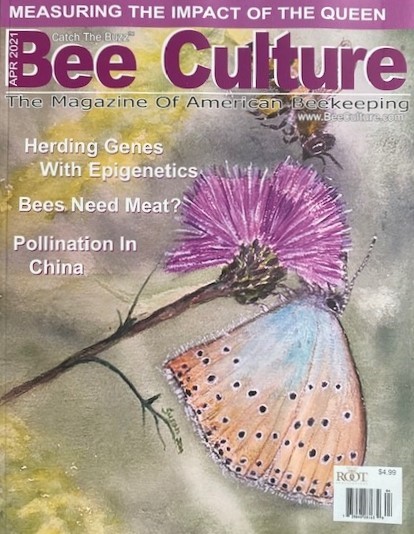
Anderson K.E. 2021. Bees Need Meat? Bee Culture: The Magazine of American Beekeeping
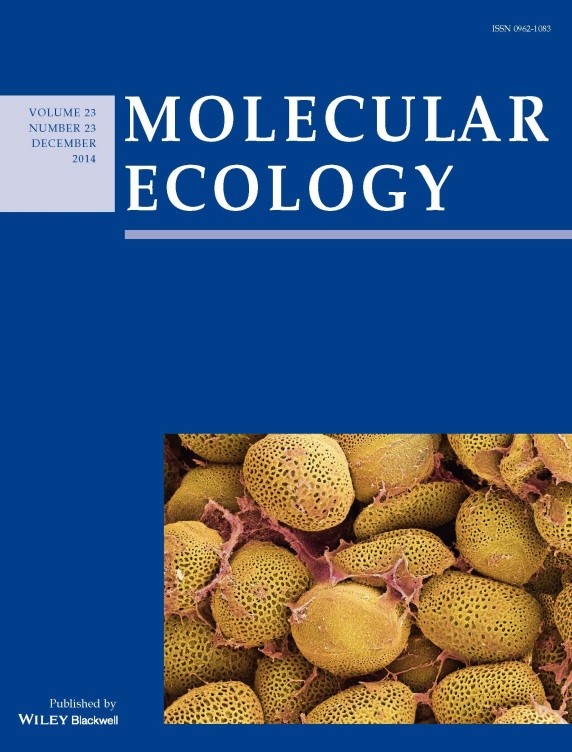
Anderson K.E., M.J. Carroll, T. Sheehan, B.M. Mott, P. Maes, and V. Corby-Harris. 2014. Hive-stored pollen of honey bees: Many lines of evidence are consistent with pollen preservation, not nutrient conversion. Molecular Ecology. doi: 10.11aa11/mec.12966

Ricigliano VA, Fitz W, Copeland DC, Mott BM, Maes P, Floyd AS, Dockstader A, Anderson KE. 2017. The impact of pollen consumption on honey bee (Apis mellifera) digestive physiology and carbohydrate metabolism. Arch. Insect Biochem. Physiol. 96:1–14.
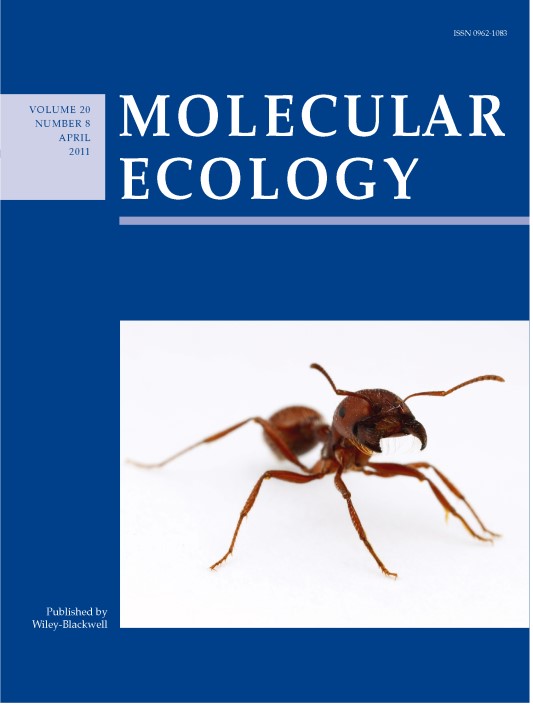
Anderson K.E., D.E. Wheeler, K. Yang and T.A. Linksvayer. 2011. Dynamics of an ant–ant obligate mutualism: colony growth, density dependence and frequency dependence. Molecular Ecology. 20:1781–1793.
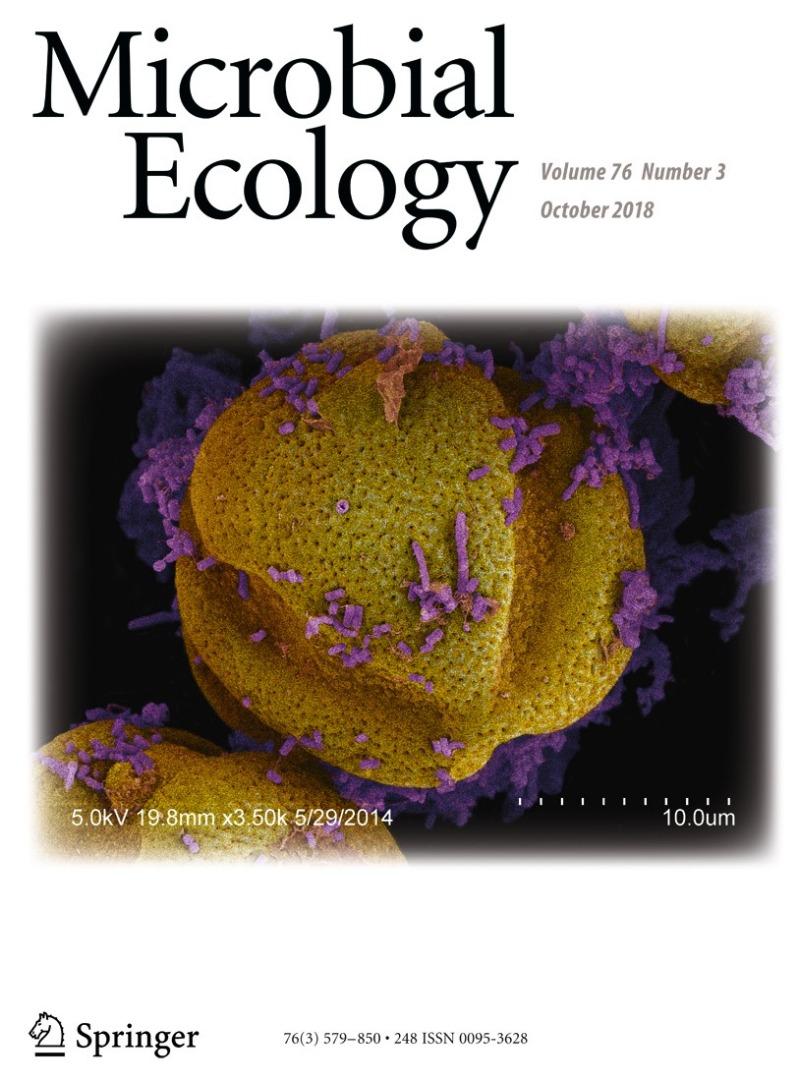
Rothman JA, Carroll MJ, Meikle WG, Anderson KE, McFrederick QS. 2018. Longitudinal Effects of Supplemental Forage on the Honey Bee (Apis mellifera) Microbiota and Inter- and Intra-Colony Variability. Microbial Ecology. doi.org/10.1007/s00248-018-1151-y
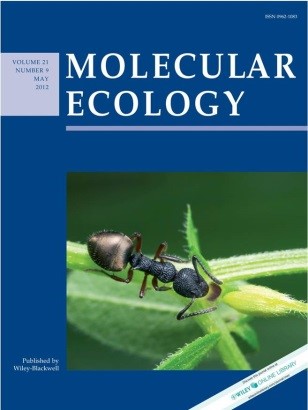
Anderson K.E., J.A. Russell*, C.S. Moreau, S. Kautz, K.E. Sullam, Y. Hu, U. Basinger, B.M. Mott, N. Buck, and D. E. Wheeler. 2012. Highly similar microbial communities are shared among related and trophically similar ant species. Molecular Ecology. DOI: 10.1111/j.1365-294X.2011.05464.x Selected for "News and Views" coverage. (Cover) *Co-first author
